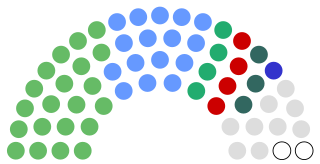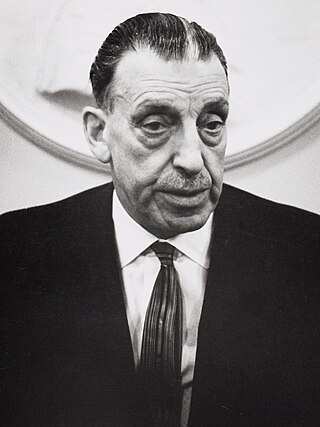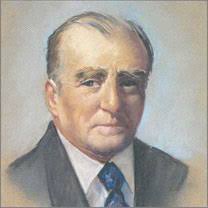Art Cosgrove, (born 1 June 1940) in Newry, County Down, Northern Ireland, was president of University College Dublin (UCD) between 1994 and 2003.
Art Cosgrove, (born 1 June 1940) in Newry, County Down, Northern Ireland, was president of University College Dublin (UCD) between 1994 and 2003.
He was educated at the Abbey Christian Brothers' Grammar School, Newry. [1] He graduated from Queen's University Belfast in 1961 with a first class honours BA in History, [1] and attended the Institute of Historical Research, in London from 1961 to 1962. [1] He was awarded a PhD by Queen's in 1971 and an LLD honoris causa in 1975 for distinction in historical work. [1] In 2007 Cosgrove obtained the Barrister-at-Law degree qualification from King's Inns but declined to take the statutory Irish exams needed to be called to the Bar by the Chief Justice of Ireland. [2] He took legal action over the issue. [3] Cosgrove was understood to be fluent in Irish but considered that the exam required by legislation passed in 1929 to be inappropriate in 2007. [2] The Legal Practitioners (Irish Language) Act 2008 was enacted following his action, which provided for a system for barristers and solicitors to learn Irish as part of their studies. [4]

The Oireachtas, sometimes referred to as Oireachtas Éireann, is the bicameral parliament of Ireland. The Oireachtas consists of:

The title of Senior Counsel or State Counsel is given to a senior lawyer in some countries that were formerly part of the British Empire. "Senior Counsel" is used in current or former Commonwealth countries or jurisdictions that have chosen to change the title "King's Counsel" to a name without monarchical connotations, usually related to the British monarch that is no longer head of state, such that reference to the King is no longer appropriate. Examples of jurisdictions that have made the change because of the latter reason include Mauritius, Zambia, India, Hong Kong, Ireland, South Africa, Kenya, Malawi, Singapore, Guyana and Trinidad and Tobago. Jurisdictions that have retained the monarch as head of state, but have nonetheless opted for the new title include some states and territories of Australia, as well as Belize.

The 1961 Irish general election to the 17th Dáil was held on Wednesday, 4 October, following the dissolution of the 16th Dáil on 15 September by President Éamon de Valera on the request of Taoiseach Seán Lemass. The general election took place in 38 Dáil constituencies throughout Ireland for 144 seats in Dáil Éireann, the house of representatives of the Oireachtas, which had been reduced in size by three seats from the previous election by the Electoral (Amendment) Act 1961. Fianna Fáil lost its majority but remained the dominant party

Dún Laoghaire–Rathdown is a county in Ireland. It is in the province of Leinster and the Eastern and Midland Region. It is one of three successor counties to County Dublin, which was disestablished in 1994. It is named after the former borough of Dún Laoghaire and the barony of Rathdown. Dún Laoghaire–Rathdown County Council is the local authority for the county. The population of the county was 218,018 at the time of the 2016 census.
Clare is a parliamentary constituency represented in Dáil Éireann, the lower house of the Irish parliament or Oireachtas. The constituency elects four deputies on the system of proportional representation by means of the single transferable vote (PR-STV).
Galway East is a parliamentary constituency represented in Dáil Éireann, the lower house of the Irish parliament or Oireachtas. The constituency elects 3 deputies on the system of proportional representation by means of the single transferable vote (PR-STV).
Cork South-West is a parliamentary constituency represented in Dáil Éireann, the lower house of the Irish parliament or Oireachtas. The constituency elects 3 deputies on the system of proportional representation by means of the single transferable vote (PR-STV).
Dublin Central is a parliamentary constituency represented in Dáil Éireann, the lower house of the Irish parliament or Oireachtas. The constituency elects 4 deputies on the system of proportional representation by means of the single transferable vote (PR-STV).

Dublin North-Central was a parliamentary constituency represented in Dáil Éireann, the lower house of the Irish parliament or Oireachtas, from 1948 to 2016. The method of election was proportional representation by means of the single transferable vote (PR-STV).

Dublin North-East was a parliamentary constituency represented in Dáil Éireann, the lower house of the Irish parliament or Oireachtas, from 1937 to 1977 and from 1981 to 2016. The method of election was proportional representation by means of the single transferable vote (PR-STV).
Dublin North-West is a parliamentary constituency represented in Dáil Éireann, the lower house of the Irish parliament or Oireachtas. The constituency elects 3 deputies on the system of proportional representation by means of the single transferable vote (PR-STV).

Dublin South was a parliamentary constituency represented in Dáil Éireann, the lower house of the Irish parliament or Oireachtas, from 1981 to 2016 representing an area in the south of County Dublin. A previous constituency of the same name existed in Dublin City from 1921 to 1948. The method of election was proportional representation by means of the single transferable vote (PR-STV).
Dublin South-Central is a parliamentary constituency represented in Dáil Éireann, the lower house of the Irish parliament or Oireachtas. The constituency elects 4 deputies on the system of proportional representation by means of the single transferable vote (PR-STV).
Dublin South-West is a parliamentary constituency represented in Dáil Éireann, the lower house of the Irish parliament or Oireachtas. The constituency elects 5 deputies on the system of proportional representation by means of the single transferable vote (PR-STV).

Seán Dublin Bay Rockall Loftus was an Irish environmentalist, barrister and politician who drew attention to his campaign issues by changing his name. He was often known as "Dublin Bay Loftus". He was a member of Dublin City Council for 25 years, an alderman for much of that time, and a member of the council's Planning and Development Committee. Loftus is often credited as being one of the first advocates for environmentalism in Irish politics, with former Green Party leader John Gormley stating that Loftus "led the way even before the Green Party came into existence. Sean never wavered in his pursuit of the highest environmental ideals". Besides his environmentalist views, Loftus subscribed to the label of Christian Democrat and was socially conservative, opposing moves by Taoiseach Garret FitzGerald to liberalise Irish laws around divorce, contraceptives, and abortion.
The Constituency Commission is an independent commission in Ireland which had advised on redrawing of constituency boundaries of Dáil constituencies for the election of members to Dáil Éireann and European Parliament constituencies prior to the establishment of the Electoral Commission in 2023. Each commission was established by the Minister for Housing, Planning and Local Government after the census. The Commission then submitted a non-binding report to the Oireachtas, and was dissolved. A separate but similar Local Electoral Area Boundary Committee fulfilled the same function for local electoral area boundaries of local government areas.

Conor Alexander Maguire was an Irish politician, lawyer and judge who served as Chief Justice of Ireland from 1946 to 1961, a Judge of the Supreme Court from 1946 to 1961, President of the High Court, a Judge of the High Court from 1936 to 1946 and Attorney General of Ireland from March 1932 to November 1932. He served as a Teachta Dála (TD) for the National University of Ireland constituency from 1932 to 1936.

The Bar of Ireland is the professional association of barristers for Ireland, with over 2,000 members. It is based in the Law Library, with premises in Dublin and Cork. It is governed by the General Council of the Bar of Ireland, which was established in 1897. The Council is composed of twenty-five members: twenty who are elected, four co-opted, and the Attorney-General, who holds office ex officio. Every year, ten members are elected for two-year terms; five by senior counsel and five by junior counsel.
In Ireland, the term city has somewhat differing meanings in Northern Ireland and the Republic of Ireland.

The Electoral (Amendment) Act 2009 is a law of Ireland which amended electoral law, including revisions to Dáil constituencies and European Parliament constituencies in light of the 2006 census. The new European Parliament constituencies were used at the election in June 2009. The revision to Dáil constituencies took effect on the dissolution of the 30th Dáil on 1 February 2011 and a general election for the 31st Dáil on the revised constituencies took place on 25 February 2011.